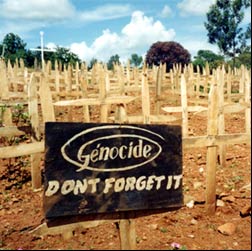
|
Today, the killing field is marked with white wooden crosses and enclosed by a metal gate with an arched sign reading..."IBUKA - Qui ne répondrait en ce monde à la terrible obstination du crime, si ce n'est l'obstination du témoignage....!" —"Who will answer in this world to the terrible persistence of crime if there is no persistence of witnessing?" Photo: D. George |
|
Butare Kigali Kibuye Bisesero
Rwanda Killing Field April 8, 1994 Early in the morning of April 7, 1994, Tutsis began arriving at the école Technique Officielle (ETO) on the outskirts of Kigali, seeking the protection of the 90 Belgian UN peacekeepers stationed there. At first, the Belgians said the people would have to leave by the next morning, but later they peacekeepers relented and let them stay on the school grounds. The next day, though, the refugees learned that their protectors were going to leave the compound to help evacuate foreigners remaining in Kigali. At that point, there were at least 2,000 Rwandans at the school, including 400 children. They pleaded with the soldiers not to leave them behind to certain death. Some even begged to be shot—so they wouldn't be hacked to death. A little after one o'clock on the afternoon, the Belgians got into their jeeps and drove off. Some desperate Rwandans tried to block the convoy by lying down in the road, but the soldiers fired over their heads. Almost immediately after the Belgians left, Rwandan soldiers and militia entered the school grounds. They herded the refugees along a dirt road to a nearby place called Nyanza-Rebero. At a clearing, the Tutsis were told to sit down and the Hutu leaders ordered their men to "begin work". They attacked with machetes, grenades and guns. By late afternoon—as the sun was going down, and most of the people were dead or dying—the soldiers left. Karasira Venuste was wounded, but survived by hiding under a pile of corpses. He estimates about 50 of the more than 2,000 Tutsis were left alive. Sources:Interviews with survivors conducted by ARW correspondents Michael Montgomery and Deborah George. Africa Rights, "Left To Die At ETO And Nyanza :The Stories of Rwandese Civilians Abandoned by UN Troops on 11 April 1994." April 11, 2001. |
| Close Window |